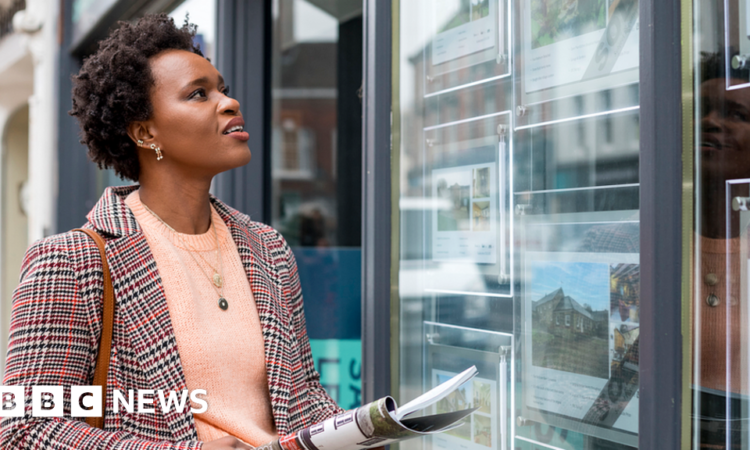
- By Kevin Peachey
- Cost of living correspondent
Image source, Getty Images
Mortgage lenders will be questioned by MPs on Tuesday as the typical rate on a two-year fixed deal is close to surpassing the mini-budget peak.
The average interest rate on a deal is now 6.63%, only slightly lower than a high of 6.65% on 20 October last year.
Mortgage costs have been soaring recently as lenders grapple with inflation and uncertainty over interest rates set by the Bank of England.
Bank and building societies bosses will be in front of the Treasury Committee.
The hearing, which starts at 10:15 BST will cover the mortgage stress faced by borrowers, the response to people falling behind on repayments and the wider impact on the UK housing market.
Mortgage rates have risen consistently and – at times – sharply over recent weeks, with the possibility of more increases to come.
Data on wages and rising prices mean markets anticipate that inflation and interest rates will stay higher for longer in the UK than previously expected, which has been reflected in the funding costs of mortgages.
That has pushed typical mortgage rates to the peak seen in the aftermath of the mini-budget during Liz Truss’s short-lived premiership.
If the average two-year rate breaches 6.65%, then it will be the highest since August 2008, according to the financial information service Moneyfacts.
Mortgage rates 15 years ago hit 7%, as global economies were hit by a banking crisis.
The Bank of England has been raising the benchmark interest rate in an attempt to tackle the inflation rate which remains stubbornly high.
The expectation of further increases has pushed up the cost of funding mortgages, and so lenders have been increasing the rates they charge customers.
For people coming off fixed deals and looking for a new one, there is the potential of having to pay hundreds of pounds more a month.
Around 2.4 million fixed-rate mortgages are due to end between now and the end of 2024, according to figures from banking trade association UK Finance.
Aaron Strutt, from mortgage broker Trinity Financial, said that the uncertainty of the situation made it difficult for lenders to price mortgages. A rush of people trying to secure deals at lower rates had meant the money allocated by some providers to lend in mortgages was drained.
He added that there was evidence of a split with large numbers of people renewing with their existing lender, without the requirement for further affordability assessments.
The recent rises in mortgage costs are also likely to have a knock-on effect on renters who could face higher payments as landlords seek to recoup the rising cost of higher mortgages. Squeezed landlords may decide to sell properties, which could lead to fewer homes available to rent, according to the National Residential Landlords Association.
Following a meeting with Chancellor Jeremy Hunt, lenders agreed to some flexibility and making sure homes are not swiftly repossessed from those struggling to pay.
Labour is also planning to hold its own mortgage summit in the coming days.
What happens if I miss a mortgage payment?
- A shortfall equivalent to two or more months’ repayments means you are officially in arrears
- Your lender must then treat you fairly by considering any requests about changing how you pay, perhaps with lower repayments for a short period
- Any arrangement you come to will be reflected on your credit file – affecting your ability to borrow money in the future





